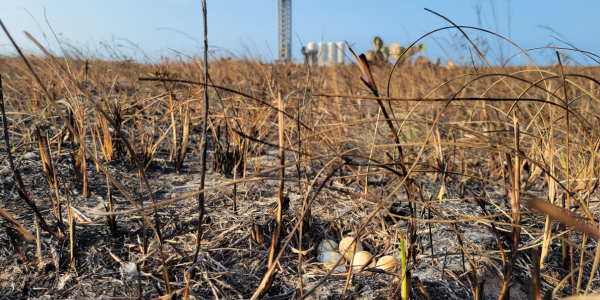New Claims Filed Over SpaceX Launchpad Explosion
Piping Plover by Ray Hennessey.
BROWNSVILLE, Texas, December 15, 2023)— National and local environmental groups and the Carrizo/Comecrudo Nation of Texas, Inc., filed additional legal claims today against the Federal Aviation Administration (FAA) and U.S. Fish and Wildlife Service (USFWS).
Today’s filing focuses on the agencies’ failure to fully analyze and mitigate environmental harms from the April 20 explosion of the SpaceX Starship/Super Heavy rocket and launchpad at Boca Chica in south Texas.
The April 20 launch resulted in the ejection of concrete and metal thousands of feet into the surrounding lands. This included sensitive tidal flats and other habitat for migratory birds and federally protected species covering an approximate 385-acre area, nearly 3 acres of which were sensitive dune vegetation that was severely burned. A plume of dust also blanketed a residential area more than six miles from the launchpad.
SpaceX’s Boca Chica launch site is surrounded by state parks and national wildlife refuge lands and important habitat for imperiled wildlife, including Piping Plovers, Northern Aplomado Falcons, Red Knots, Gulf Coast Jaguarundi, Ocelots, and the Critically Endangered Kemp’s Ridley Sea Turtle.
Despite an ongoing lawsuit, the FAA decided that a supplemental environmental analysis wasn’t warranted. The agency also refused to provide an opportunity for public comment before permitting the second launch on November 18, 2023.
Today’s complaint also argues that USFWS failed to address the harm from the April 20 explosion and efforts to recover thousands of chunks of concrete and metal from sensitive tidal flat habitat. The Service further failed to address excessive noise and vibrations from the first launch, including reports that noise levels greatly exceeded what was expected.
“Regulators are playing Russian roulette with one of the most critical and sensitive habitats for migratory birds in the country,” said Jared Margolis, a senior attorney at the Center for Biological Diversity. “Failing to do an in-depth environmental review and letting SpaceX keep launching the world’s largest rockets that repeatedly explode shows a shocking disregard for wildlife and communities. SpaceX should not be given free rein to use this amazing area as a sacrifice zone.”
“Approving a massive rocket test launch facility only steps from our state park and national wildlife refuge is unconscionable,” said Mary Angela Branch, board member at Save RGV. “This failed launch shows the extent of damage, not just to our wildlife and sensitive ecosystem, but to our residential, recreational, and tourist communities. The noise, debris, vibrations and explosion proved far too extreme to not be given full environmental assessment by the FAA and Fish and Wildlife Service. Failure to do so is pure negligence and exhibits a blatant disregard for our community life.”
The new complaint further states that the FAA relied entirely on a SpaceX-conducted investigation of the April 20 explosion. The agency doesn’t appear to have conducted an independent investigation. The FAA only required SpaceX to implement corrective actions proposed by the company itself, with no analysis of whether additional or alternative mitigation is necessary to prevent further explosions.
“The Surfrider Foundation has concerns about Starship Super Heavy launches and ongoing impacts to the coastal and marine environments in the area,” said Sarah Damron, senior regional manager for the Southeast, Texas and Great Lakes region for the Surfrider Foundation. “The test launch in April resulted in a massive debris field that extended into the Gulf of Mexico, and both of the most recent test launches ended with rapid unscheduled disassembly of the launch vehicles with uncontrolled impacts. Surfrider also has ongoing concerns that operations continue to frequently shut down public access to Boca Chica Beach and the only road to it, Highway 4. This affects visitors and nearby residents, including those from Latinx, Chicanx, Indigenous, and low-income communities.”
One change made to the Starship/Superheavy launch facility since April was the implementation of a deluge water system, which sprays water through holes in a steel plate to cool the launchpad. Regulators acknowledge that deluge system runoff could contaminate nearby wetlands. But they failed entirely to analyze whether the steel plate will be sufficient to prevent further explosions, particularly as it erodes from further use.
“SpaceX should uphold the same environmental standards we expect from other industries,” said Michael J. Parr, president of American Bird Conservancy (ABC). “It’s ironic that the effort to visit other planets is trashing sensitive habitats here at home — including those that are essential to threatened wildlife like the Piping Plover. We’re asking again that protections be upheld for this and other threatened species.”
The November 18 launch, which used an unpermitted deluge system, revealed chemical odors from the uncollected runoff into the wetlands.
At least nine rockets have exploded at the Boca Chica site over the past five years. Federal officials acknowledge that further explosions are likely over the next five years. Yet the agencies tasked with protecting people and wildlife from harm are continuing to fail to fully analyze the impacts of SpaceX’s activities, today’s complaint notes.
“The Carrizo/Comecrudo people won’t stand by and watch as Boca Chica is used as a sacrifice zone for SpaceX rockets,” said Juan Mancias, tribal chair of the Carrizo/Comecrudo Nation of Texas, Inc. “Boca Chica is sacred and central to our creation story. We won’t let imperialist policies threaten our cultural heritage. It is ludicrous that the FAA continues to ignore its legal duties based on erroneous and biased information provided by SpaceX.”
The new complaint was filed in federal district court in Washington, D.C., by the Center for Biological Diversity, ABC, Carrizo/Comecrudo Nation of Texas, Inc., Save RGV, and Surfrider Foundation.






